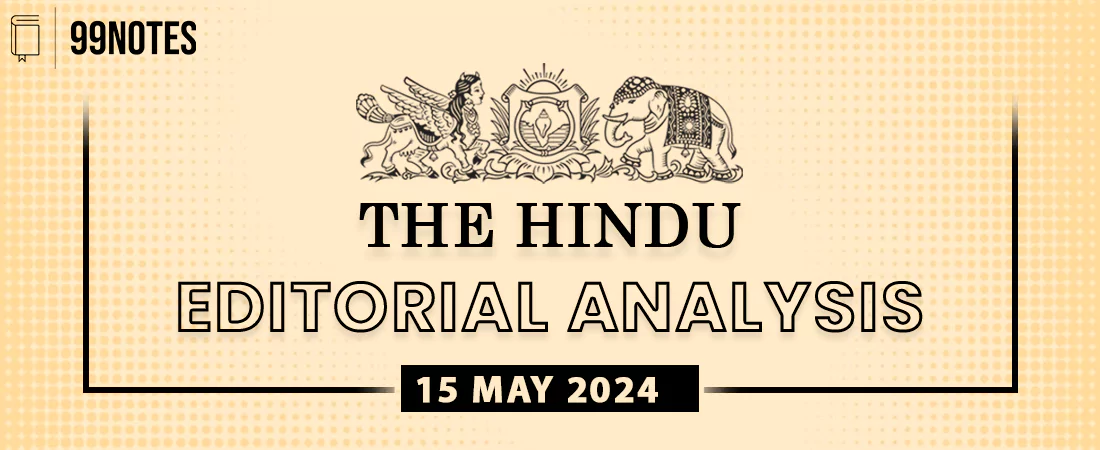15 May 2024 : The Hindu Editorial Notes PDF
1. Young people fade away when there is no vision
| Topic: GS1 – Indian Society – Social Empowerment. |
| Context |
| ● The article discusses the alarming trend of student suicides in Kota, Rajasthan, attributed to academic pressure from competitive entrance examinations.
● It highlights the detrimental effects of coaching institutes and standardised entrance exams on students’ mental health and advocates for reforms to prioritise holistic education and student well-being. |
Rising Suicide Cases in Kota, Rajasthan
- Recent suicides in Kota, Rajasthan, attributed to academic pressure, particularly from competitive entrance examinations, have raised concerns about the well-being of young students.
- The trend of student suicides due to exam stress is not new and requires immediate attention to prevent further tragedies.
Addressing the Root Causes
- The pressure faced by students stems from societal expectations, including family pressure and the emphasis on academic success.
- While some factors like family pressure may require societal changes, other stressors can be addressed through reforms in examination systems and educational policies.
Impact of Coaching Institutes
- The prevalence of coaching institutes in Kota and similar educational hubs exacerbates student stress, with students often sacrificing their social development for academic success.
- These institutes, characterised by intense study schedules and unhealthy environments, contribute to the mental and physical strain experienced by students.
Challenges of Entrance Examinations
- The introduction of the Common University Entrance Test (CUET) and similar standardised exams overlooks the holistic development of students and places undue emphasis on test scores.
- Despite the proliferation of coaching centres promising success, the quality of students entering higher education institutions remains a concern, indicating a disconnect between exam performance and academic preparedness.
Strengthening School Education
- To alleviate the pressure on students, government schools need to be improved through measures such as recruiting qualified teachers and upgrading infrastructure.
- Rather than solely relying on standardised entrance exams, the importance of school education should be emphasised to provide a strong foundation for students.
Role of Personal Interviews
- Entrance examinations should incorporate personal interview components to assess students’ non-academic skills and talents.
- Personal interviews offer students an opportunity to showcase their abilities beyond test scores, promoting a more holistic evaluation process.
Implementing Reforms
- The inclusion of personal interviews alongside academic scores can help mitigate the negative effects of exam stress and provide students with a sense of worth beyond their marks.
- Institutions like St. Stephen’s College demonstrate the effectiveness of personal interviews in evaluating students’ potential and reducing desperation among applicants.
Call to Action
- Teachers, parents, policymakers, and legislators must prioritise the well-being of young students and advocate for reforms that prioritise their mental health and holistic development.
- Without proactive measures to address the root causes of student stress, the trend of student suicides will persist, posing a threat to the future of India’s youth.
| PYQ: Explain why suicide among young women is increasing in Indian society. (150 words/10m) (UPSC CSE (M) GS-1 2023) |
| Practice Question: How can the education system in India address the rising incidence of student suicides attributed to academic pressure, particularly from competitive entrance examinations? Discuss potential reforms to promote holistic education and safeguard student well-being. (150 Words /10 marks) |
2. Candid notes on the NHRC’s status deferral
| Topic: GS2 – Indian Polity – Statutory Bodies |
| Context |
| ● The National Human Rights Commission of India (NHRC) has been informed of the extension of its deferral status by the Global Alliance of National Human Rights Institutions (GANHRI).
● Despite efforts to lift the deferral, the NHRC’s ‘A’ status remains deferred for another year, raising concerns about India’s compliance with international human rights standards and its approach to human rights issues. |
NHRC’s Status Deferral:
- The National Human Rights Commission of India (NHRC) received notification of the extension of its deferral status by the Global Alliance of National Human Rights Institutions (GANHRI).
- The deferral, initiated in 2023, will continue for another year, despite the NHRC’s efforts to have it lifted.
- While the NHRC and the government sought to prevent a downgrade, they are relieved that the NHRC’s ‘A’ status remains intact for now.
- Justice Arun Mishra, the NHRC chairperson, faced uncertainty as his tenure ends soon, potentially leaving the NHRC in a vulnerable position.
| Global Alliance of National Human Rights Institutions (GANHRI): |
| ● Formation: The Global Alliance of National Human Rights Institutions (GANHRI) is an international association established in 1993 to support and strengthen national human rights institutions (NHRIs) worldwide.
● Membership: GANHRI consists of NHRIs from various countries, including ombudsmen, human rights commissions, and similar bodies accredited or recognized by their respective governments. ● Mandate: GANHRI’s mandate includes promoting and protecting human rights in accordance with international standards, strengthening the capacity and independence of NHRIs, and facilitating cooperation and collaboration among member institutions. ● Activities: GANHRI conducts training programs, workshops, and capacity-building initiatives for NHRIs, facilitates peer learning and exchange of best practices, and advocates for the establishment and strengthening of NHRIs globally. ● Advocacy: GANHRI engages in advocacy efforts at the international level to promote the role and importance of NHRIs in advancing human rights, including through participation in United Nations forums and processes. |
Controversial NHRC Brochure:
- A brochure titled ‘Human Rights 75’ published by the NHRC under Justice Mishra’s tenure sparked controversy.
- The brochure referenced ancient texts like the Manusmriti to establish India’s human rights principles, drawing criticism for its mention of a text associated with discrimination.
- Questions arose regarding Justice Mishra’s stance on human rights principles, especially in relation to the values enshrined in the Indian Constitution.
Concerns Over Compliance with Paris Principles:
- The GANHRI’s decision to defer NHRC’s status was primarily due to concerns over India’s adherence to the Paris Principles.
- These principles outline benchmarks for National Human Rights Institutions (NHRIs), including autonomy, independence, pluralism, resources, and investigative powers.
- NHRC’s ‘A’ status is contingent upon compliance with these principles, and the GANHRI’s doubts persist regarding NHRC’s adherence.
Evaluation Process and Diplomatic Responses:
- GANHRI’s evaluation process is peer-reviewed and objective, focusing on NHRC’s compliance with international human rights standards.
- External Affairs Minister S. Jaishankar, while sensitive to criticisms of India’s human rights record, has adopted a defensive stance, highlighting deficiencies in the West’s record.
- Diplomatic efforts to defend India’s human rights record have been met with limited success, as evidenced by the NHRC’s continued deferral status.
Challenges and Reflection:
- Challenges persist regarding NHRC’s composition, appointments, and vacancies, raising concerns about its effectiveness and credibility.
- The NHRC must engage in introspection regarding its approach to human rights issues and its alignment with international standards and principles.
- There is a need for a more nuanced and diplomatic approach in addressing criticisms of India’s human rights record, emphasizing dialogue and engagement rather than confrontation.
| The National Human Rights Commission-India: |
| ● Establishment: The National Human Rights Commission (NHRC) of India was established on October 12, 1993, under the Protection of Human Rights Act, 1993.
● Mandate: NHRC is a statutory body tasked with promoting and protecting human rights in India. ● Composition: The commission consists of a chairperson and several members appointed by the President of India, including representatives from diverse backgrounds. ● Functions: NHRC investigates complaints of human rights violations, conducts inquiries, and recommends remedial measures to the government. ● Powers: NHRC has the authority to summon witnesses, requisition documents, and intervene in court proceedings related to human rights issues. ● Awareness and Education: NHRC conducts awareness programs, seminars, and workshops to promote human rights literacy and sensitivity among various stakeholders. ● Monitoring: NHRC monitors the implementation of human rights safeguards and legal provisions at the national and state levels. ● International Cooperation: NHRC collaborates with international organisations and human rights bodies to exchange information and best practices and participate in global human rights discourse. |
| PYQ: National Human Rights Commission (NHRC) in India can be most effective when its tasks are adequately supported by other mechanisms that ensure the accountability of a government. In light of the above observation assess the role of NHRC as an effective complement to the judiciary and other institutions in promoting and protecting human rights standards. (200 words/12.5m) (UPSC CSE (M) GS-2 2014) |
| Practice Question: How does the deferral of the National Human Rights Commission of India’s (NHRC) ‘A’ status by the Global Alliance of National Human Rights Institutions (GANHRI) reflect on India’s adherence to international human rights standards? Discuss the implications of this deferral for India’s human rights governance. (150 Words /10 marks) |





